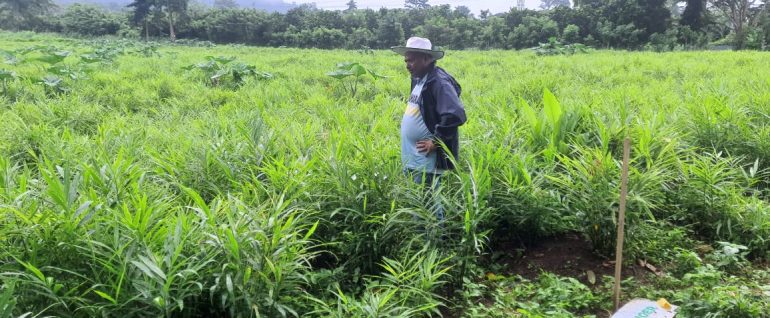When talking about African agriculture, Turmeric is not the first topic. Over 80% of all Turmeric in the world is produced in India with China (8%), Myanmar (4%), Nigeria (3%), Bangladesh (3%), and the rest of the world the remaining 2%. If Africa as a continent only contributes to something over 3% of the world’s production, why would I be dedicating posts to that?
Because it is an opportunity, and someone has found it. Byju K. John reached out to Agri Project Africa to tell me about his project in Ghana. It is an interesting story. A story that highlights all the opportunities that exist around us. Byju John came to Ghana from India in early 2021 and immediately set to work. After growing up in agriculture he felt the need for a new environment and moved to Ghana. Why Ghana I asked him. “Ghana is a great place for agriculture, and there are a lot of opportunities here in the area of agriculture and farming. People are hospitable and the language is not an issue for me”, John replies. The soil is excellent for Turmeric and other crops, the climate is favorable, and you can say everything is for but nothing against growing Turmeric in Ghana”.
Byju John has set up a 100-acre farm to produce Turmeric in an area of 50 acres. Additionally, he has Ginger and Chili and is dedicating 25 acres to each.
What is the yield per acre of Turmeric? “Currently I am only using rainwater, and therefore harvesting once per year. In optimal conditions, it’s possible to get about 10 tons of Turmeric per acre. I’m not there yet, but getting closer”, John explains. Yield is similar for Ginger as Turmeric, anywhere from 6 to 10 tons per acre.
“I use the Chili for intercropping. It helps to defend against bugs and break up the area in case of diseases. Intercropping is one of the most efficient ways to prevent bugs and diseases. That together with all the other preventive measures, I try to run the farm as clean as possible. I grow both Birds Eye and Cayenne Peppers”.
In our next post with Byju John, we will be focusing on Turmeric, its history, and challenges with it in Ghana. Byju John has big plans for the future, and we will be talking about talking with him more about that in our future posts. Don’t hesitate to drop a question about Turmeric or any other issues regarding this post in the comments here below.
Stay put and follow Agri Project Africa for the whole story and other stories like this. Please share Byju John’s story on your platforms and with the agricultural community around the continent.














